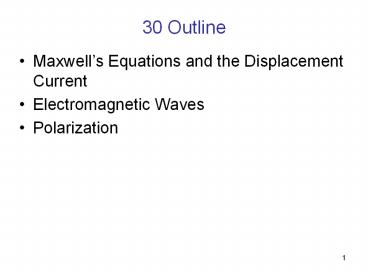30 Outline - PowerPoint PPT Presentation
1 / 24
Title:
30 Outline
Description:
Ampere's Law. 3. displacement current. explains' existence of B around E. 4. EM waves ... displacement current added to Ampere's Law: completes Maxwell Eqs. ... – PowerPoint PPT presentation
Number of Views:38
Avg rating:3.0/5.0
Title: 30 Outline
1
30 Outline
- Maxwells Equations and the Displacement Current
- Electromagnetic Waves
- Polarization
2
Maxwells Equations
- Gauss Law E B
- Faradays Law
- Amperes Law
3
displacement current
- explains existence of B around E
4
EM waves
- accelerating charges produce waves of E and B
- can be pulse or harmonic wave
5
dipole radiation
6
EM waves
- transverse E perpendicular to B
- E and B are in phase
- speed c fl 3 ? 108 m/s
7
Electric Dipole Radiation
Example
I(r 1.0m, angle 90) is 12 W/m2.
I at 2.0m and angle of 30 degrees is
8
antennas
- can respond to E or B
9
Light
- Light is an electromagnetic wave
- c lf 3 ? 108 m/s
- As light waves travel through space they
- transport energy and/or information
- transport momentum
10
(No Transcript)
11
EM Waves
- carry energy and momentum, shared equally between
the electric and magnetic fields.
12
Energy and Momentum in EM Waves
- Intensity energy/area/time watts/sq.meter
13
Example 50W Bulb
- Assume that 5.00 of the electrical power
consumed by the bulb is converted to light. The
average intensity at a distance of r 1.00m - The rms value of E
14
Polarization
- Unpolarized light is the superposition of many
waves with random direction of E. - Linearly Polarized light has only one direction
of E.
15
Polarizing Filters
- Polarizing material only allows the passage of
only one direction of E - Malus Law
16
Two Filters (incident light unpolarized)
- 1st reduces intensity by 1/2.
- 2nd reduces according to Malus Law
17
Polarization by Scattering and Reflection
- Light scattered at 90 degrees is 100 polarized.
18
Summary
- displacement current added to Amperes Law
completes Maxwell Eqs., which explain light
properties (transverse EM wave with speed c) - visible light small segment of spectrum
- energy density and pressure
- polarization by reflection/scattering
- Malus Law
19
30-4The Wave Equation for Electromagnetic Waves
Omit
End
20
Momentum
- momentum U/c
The total energy received in the time by an
area A
The momentum received
The average force
Radiation pressure
21
(No Transcript)
22
(No Transcript)
23
Example (cont.)
Part (b) 2. Use to find
3. Use to find
24
Example Consider a laser that puts out an
average power of P1.0 milliwatt in a beam
having a diameter of 1.0 mm. What is the peak
amplitude of the electric field? The area of the
laser beam is The electromagnetic flux S is
Recall so that Substitution of the
numerical values yields and thus

